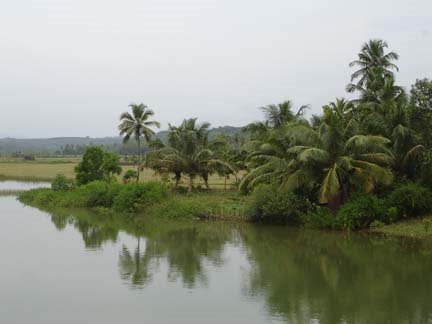“Eeru Enmura Deyyu? Moole balle Orkaaduda kurle jaitu paadla”
Translation from Tulu: “Are you Deyyu of Enmur? Come here, and listen: Go and defeat the piglets of Vorkady.”
(It is a string of a Tulu PaDdana, cited in Tulu Lexicon).
(Male pig is usually called as ‘vargale’ in Tulu language. Thus the term ‘kurle’(=piglet) might have been used in a contemptuous manner. This we can imagine scenes from the history of frequent fighting among feudal kings of yore in Tulu Nadu.)
On the trail of Vorkady
Vorkady is a village of Manjeshwara taluka, Kasaragod District, Kerala. Kasaragod was the southern tip of Tulu Nadu earlier, now merged with Kerala State.According to the 'Gramapaddhati', Tulunadu is divided into 32 Villages - 16 Western and 16 Eastern. Varkadi. or Vorkady is one of the sixteen Western Villages of Tulunadu wherein Brahmanas are settled originally.The rivulet is a tributary of Bangra Manjeshwar River. There is an ancient about 600year old Subrahmanya temple in this village.‘Vorku’ or ‘Orku’ in general means ‘increasing in volume’ (like liquids, etc.). We cannot say how it applies to Vorkady. An attempt is made to analyse this Place name.
1. Varaka+di: Varaka means jack fruit in Tamil and Sri Lanka. In Tulu, it is known as ‘Barake/Barike or Barke’ (Note: Transition of ‘va’ to ‘ba’ is common in Indian languages). ‘Barike’ is used tautologically in ‘Barike Pelakkāyi, meaning a variety of jack-fruit with hard supple edible pulp. Here ‘Barike’ has dual meaning as ‘hard or tough’, besides jack-fruit itself in repetition. So it could be a village where jack fruits are available in plenty.
2. Varike (Barike>Barke) + adi: If we quote from Census of India-1901, “Barika literally means a village watchman. In the Deccan Districts, they are usually ‘Balijas’ and entries of the name is clubbed with the caste.” In Tulu Nadu, Barike/Barke is a title of landed gentry, serving feudal Chieftain of the area (as is the case with Bhondaries of Ganjam, Orissa – q.v. Census-1901). These clans are known by their manor houses, like Barike, Guttu, Parari, etc. They are below the ‘Beeduda’ (‘Booduda’) Arasu (King). So Vorkady (Varike+ady) is a village having manor house of a Bunt with the status of Varike/Barike. When Hoysala Ballals ruled Tulu Nadu, their Chieftains were assisted by Barike Gaudas/Gouds, who migrated from Kodagu and Hasan on the eastern slope of Sahyadri (Western Ghats). Even when there is a change of overlordship, those Gaudas stayed back and served under local chieftains. Gaudas are tough people. It is possible that Barike/Barke gained the meaning of ‘hard’ (supple), as the pulp of a fruit (cf DED 5268). Jack-fruit with soft pulp is called ‘Tuluve (soft juicy pulpy) pelakkayi’ in Tulu.
The other possibilities are:
3. Vor+ka+adi : One portion of forest region. A dry region with forest cover.
4. Varak+adi: Varaku/Varak means ‘foil or leaf of gold’. Could it be a place named after goldsmiths (Merchant class of artisans), who possibly outnumbered other class of people?
5. Varaka +adi: Varaka (Oraka) has meaning of ‘a spring or fountain’ (q.v. TL-p.2782). The Village could have a watershed, providing perennial water supply. There is a small rivulet and an ancient and famous Subramanya Temple is located on one of its banks.’ Varu/Varaka’ has the meaning of canal for irrigation in Southern Dravidian languages. In Kui language, it means ‘water channel, stream, torrent or flood’ (q.v. DED-S/N-4342).
Conclusion
We could conclude, based on the expositions, that Vorkady is an ethnonym and eponym, possibly derived from the name of the ‘Barke’ families once upon a time. Or it could have been village famous for a class of jack fruits. The families must be the representatives of the Feudal Lord of the region for local administration.
-Hosabettu Vishwanath, Pune



"Vorvadi" is a place name, a portion of Kanajar Village which is forest region.
ReplyDeleteKowdoor Narayana Shetty
i was born there :)
ReplyDeleteHope it helps
Orkadu- kadu is forest. It may be Oorkadu also. May be Verkadu or Erkadu.
ReplyDeleteSundarVedanth